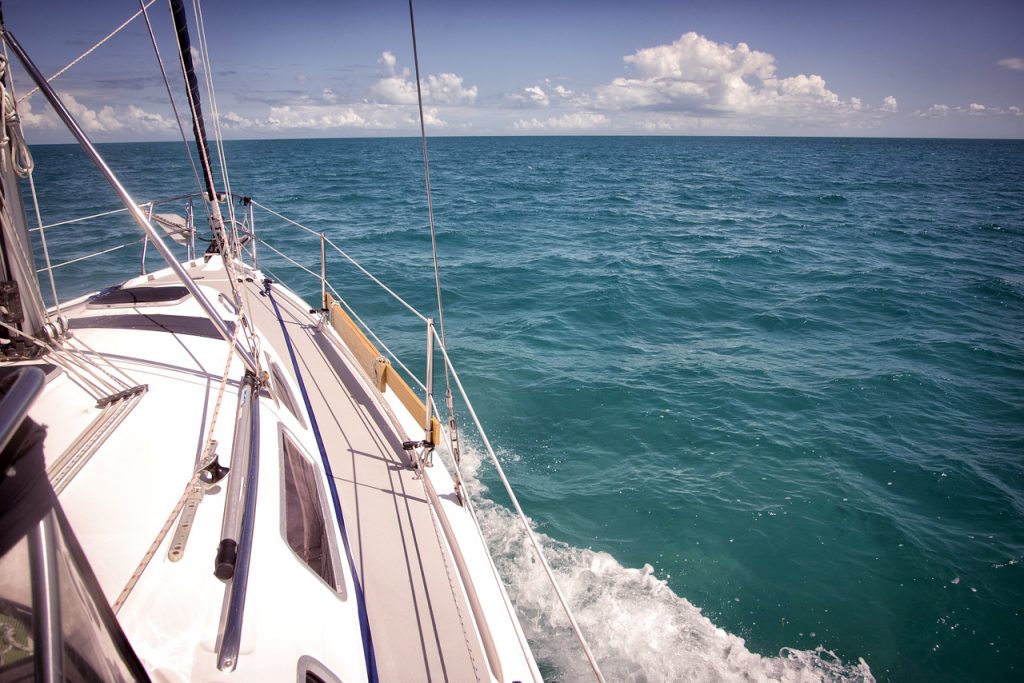Practicing pratyhara gets us through rough waters
by Debi Buzil
White sand, palm trees, waters of azure, turquoise, cerulean—all perfect shades of blue. Sunshine all day and glorious sunrise and sunset. Sweet beautiful people. Ahhh…the Bahamas!
Recently, my family and I flew to Paradise Island, Bahamas. We would have a sailing adventure and spend a week on a 41-foot French sailboat before sailing to Florida and flying back to Chicago. Our boat, Vayu, the namesake of the Hindu Lord of the Wind, would protect and carry us on the journey. We ate our meals onboard, slept under the stars, told stories and savored the experience. That is, until the storm hit.
Sailing from the Bahamas to Florida involves crossing the Gulf Stream. I’ve done that passage twice before, and it was rough. The ship captain said this trip would be different, the weather would be good for crossing, nothing for my two kids and me to worry about.
A sailboat needs to address wind, weather, tides and currents. Our boat, an award-winning cruising vessel, had a deep keel, which made the boat difficult to navigate in certain harbors and shallow waters. We needed to watch the water, look for rocks and deal with the tides and currents. Although we had proper depth, our boat was unable to leave the harbor due to the strong current. We literally couldn’t move. We made a plank out of our paddleboard from boat to dock and spent an extra hour or two swimming and eating. Our expectation of a smooth journey changed.
Pratyhara: Cultivating Inner Stillness
Carefree days are fairly rare for me. A daily practice helps me get through my urban life, and when I’m on vacation, my fold-up mat comes with me. In my yoga backpack are external practices, such as postures and breathwork, and internal ones, such as meditation and samadhi, or a state of bliss. Another of these tools is pratyahara, described as “sense withdrawal,” is one of these tools. It is how we move from simple physical relaxation to meditation, a deep rest for the whole being.
Sutra 2.54 from Patanjali’s Yoga Sutra says: svaviṣayāsaṁprayoge cittasya svarūpānukār ivendriyāṇāṁ pratyāhāraḥ.
Swami Satchidananda offers my favorite translation of this sutra: “When the senses withdraw themselves from the objects and imitate, as it were, the nature of the mind-stuff, this is pratyahara.”
The sutra describes how the mind and actions stop engaging with the outer world, so the mind can turn inward, while both body and mind are still and calm. We begin to cultivate a space between a sensory stimulus and a response: a state of non-reaction. This practice can be touched upon in savasana, final resting pose, where your attention withdraws from the external world and moves within.
A Storm Rolls In
In the Bahamas, we began our journey to Florida, changing course to avoid the black water and sky. We could no longer outrun the rain, and it poured. Three people stayed on deck, in foul weather gear, manning the boat. I was responsible for the children, huddled down below deck.
Soon the storm was upon us, pelting us with water. The sky was charcoal gray. During our journey we saw six waterspouts, actual tornadoes on the ocean—a solid column of water reaching upward to the clouds. Our seasoned crew with decades of sailing experience had never seen anything like it.
During all of this chaos, a green finch flew on board and down into the cabin, scaring my kids even more. It was just too much. My job was to stay cool and calm, and rally the kids. A younger me would have been useless, trembling and crying.
Preservation through Pratyhara
The practice of pratyahara helped me deal with the storm by responding, not reacting. We snuggled into a small storage cabin to read. We read for hours, as the storm raged on and the boat reeled. We read as lightning hit the water around us, and someone screamed down to us not to touch the mast, because we could get electrocuted. I was calm.
When the rain stopped, we could finally see land. The sunset was a gorgeous pink, and Fort Lauderdale never looked so good. Thank heavens for pratyahara, a practice that helped me contain the outer experience of the world and channel it into being my most effective self.
The Bahamas were delicious, and now, after our harrowing experience at sea, even more unforgettable. Through yoga, I can explore the feelings of contentment and freedom I had in the Bahamas in my everyday life. I may not be able to take a vacation for a while, but I certainly can do yoga. This practice can help us all weather life’s storms.
Debi Buzil is the leader of Chicago-based Kirtan group Devi 2000. She is a longtime teacher and student, and a mother of two.


























No Responses to “Sutra in the City – Sailing Through Life’s Storms”